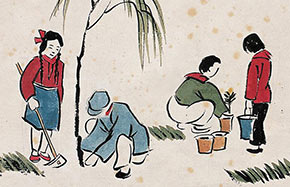Creating a model lawyer in books
More than 100 officials above ministerial level have been probed for corruption in China since the current top leadership was elected at the end of 2012.
"They can no longer bypass the law," he says. "They have to abide by the law and this is one area of legal reform that really has actually worked."
He was born in Beijing in 1953, the son of a military officer who died when He was only 10 years old.
"I had a family background of intellectuals. My father had a college degree and my mother also had a very good education by the standard of the time. She was from a big landlord family."
During the "cultural revolution" (1966-76), he went to work on a farm in Heilongjiang province in Northeast China before returning to Beijing in the late 1970s to work for a construction company - but with aspirations to become a famous writer.
It was meeting his future wife, Ren Xinping (a medical doctor to whom he has been married 35 years) that changed his life.
"Her parents wouldn't accept a plumber in a construction company as a future son-in-law, so that made me take my examinations to go to university," he says.
Initial failure in these exams proved the catalyst in his fortuitous switch to law. After earning both bachelor's and master's degrees in law at Renmin, He also went on to do a doctorate in juridical science at Northwestern University in the US.
His parallel literary career took off in 1995 with the publication of Hanging Devils in 1995.
One French newspaper has described his work as being similar to that of Sir Arthur Conan Doyle.
"I actually like Sherlock Holmes and also Agatha Christie. I have also had some inspiration from modern writers like Scott Turow and, of course, I have been referred to as the John Grisham of China since we have this similar background in the field of law."
He is something of a convert on one of the key legal issues in China - capital punishment.
The academic used to believe the country's stance on the death penalty was right because it truly reflected public opinion.
"I changed my mind after leading a group of people conducting a study on unlawful convictions for about 10 years. I noticed there were some loopholes in our criminal justice system and because it is just human nature, there were mistakes by judges, prosecutors and police officers. In the case of capital punishment, mistakes are always inevitably very serious ones because there is obviously no way to correct them."
He has also actively campaigned for more than a decade for a better operating court system in China with more focus on trial proceedings.
The government has now accepted there are needs to have a more trial-centered approach.
"The trial in the court room (in China) is not a substantive part of proceedings but a move to this is the way to promote judicial independence," he says.


















